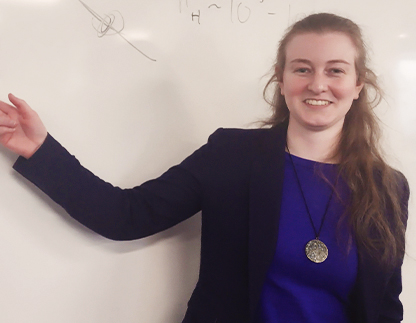Grades matter, but so does your general well-being. Make time for things outside of school, studying, and research.”
Nastasha Wijers (she/her)
Postdoctoral Trainee in the Center for Interdisciplinary Exploration and Research in Astrophysics (CIERA)

Nastasha Wijers is a postdoctoral trainee in the Center for Interdisciplinary Exploration and Research in Astrophysics (CIERA). She is interested in galaxy formation and the circumgalactic medium (i.e., a diffuse halo of gas that surrounds galaxies). In particular, she wants to know how galaxies and circumgalactic gas shape and are shaped by the circumgalactic medium and the flow of baryons between it, the galaxy, and the intergalactic medium (i.e., even more diffuse gases that form a web connecting galaxies and their haloes). Her work identifies ways of finding circumgalactic gas, articulates how what we find is connected to the properties of the circumgalactic medium, and explains what that tells us about the physical processes shaping this gas.
How would you describe your research and/or work to a non-academic audience?
I research the gas around galaxies. There was not enough gas within galaxies in the past to explain how many stars are still forming there now. The diffuse halo of gas around galaxies must therefore be an additional 'fuel' source for star formation in galaxies. However, if it were not for supernova explosions and ‘feeding' supermassive black holes—which heat gas and/or eject it from galaxies—too many stars would form. This gas can also be ejected from the haloes surrounding galaxies entirely. Therefore, measuring the mass and properties of the gas around galaxies can tell us something about how star formation in galaxies is regulated. In my research, I use computer simulations of galaxy formation to try to figure out how we can best study this galaxy halo gas, and what different observations can tell us about how star formation is regulated.
What is a mistake you have learned from in your career?
When I started my PhD, I tended to try to figure out everything on my own. I've learned that it's ok to ask for help earlier on, which can save a lot of time and frustration. I've also learned the hard way that working from home doesn't generally work well for me, which has been a bit of an issue during the pandemic.
What do you find both rewarding and challenging about your research and/or work?
The rewarding parts of research for me are when I figure out what's causing something or how a process works. Challenges include digging through my code to figure out where something went wrong, and more broadly, making time to work on long-term research projects when there are tasks with short-term deadlines like reading a paper for journal club or going over a draft of a paper where I'm a co-author.
Why Northwestern?
There is a good galaxy formation and galaxy halo gas simulation research group here (Professor Claude-André Faucher-Giguère's FIRE group at CIERA) and after doing my BSc, MSc, and PhD in Europe, I wanted to learn what astronomy in the US was like.
How do you unwind after a long day?
I mostly just watch YouTube or Netflix, and I listen to music.
What books are on your bedside table?
Liu Cixin’s sci-fi novel Death's End and Sarah Rudell Beach’s And Breathe...: Daily meditations and mantras for greater calm, balance, and joy.
What inspires you?
Curiosity, mostly. A lot of my day-to-day work is programming, which often presents the sort of puzzles I really latch on to: 'How do I approach this?' or more often, 'What's causing this bug?' On a wider scale, I want to figure out how certain processes work, which ones are most important, and how we can test those ideas with observations. I really like to dig into a problem/question and try to get to the bottom of it.
What did you originally want to be when you grew up?
I have wanted to be a researcher for as long as I can remember. Through high school and college, I first narrowed this down to something in physics or mathematics, and then later to astrophysics in particular.
What advice would you give your younger self or someone considering a similar path?
Grades matter, but so does your general well-being. Make time for things outside of school, studying, and research (this mainly applies to my anxious and career-focused younger self).
Tell us about a time when things did not go as you planned, what did you learn?
I was a co-author on a project where I generated the first-step data for synthetic observations from a computer simulation. The lead author used that data to produce the synthetic observations, then searched the data to find out what could be observed with a specific planned telescope. Just after the paper on the project was accepted for publication, someone porting the code I had used to generate the first-step data found a bug in the code, which led to an error in unit conversions. We had to cancel publication and I needed a long time to debug the code. The fix should have been simple, but of course, other problems cropped up. Fixing the code took long enough that the lead author left the project (she was finishing her PhD), and now the paper is delayed longer as a new student learns how to continue the project. I mostly learned that bugs can come to light at very inconvenient moments, and you can never be sure you've actually caught them all.
What are you most proud of in your career to date?
Getting my PhD.
Published: April 11, 2023
If you know a graduate student, postdoctoral trainee, graduate faculty member, staff member, or a member of our TGS alumni population who would make a great candidate for our TGS Spotlight Series, please complete this brief TGS Spotlight Series Nomination Form.